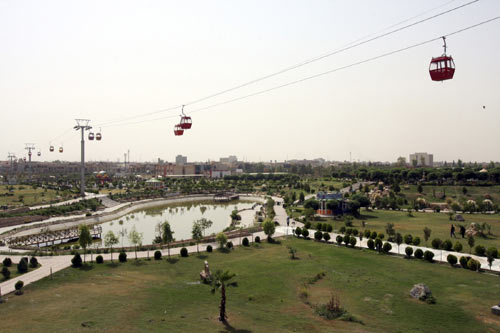Top News
A stormy Iraq belies a sunny Kurdistan
By Shamal Aqrawi (China Daily)
Updated: 2010-10-01 08:10
 |
Large Medium Small |
|
|
ERBIL, Iraq - While most Iraqis struggle under the detritus of a seven-year war, the people of Erbil in Iraqi Kurdistan can frolic in a public pool, ride an elevated cable car over freshly planted parkland or escape stifling heat in a new ice skating hall.
The new luxuries of Iraq's northern Kurdish region seem a world apart from the dust and grit of Baghdad, where suicide bombers are an everyday fear, dirt-gray blast walls dominate a war-weary cityscape, hotels are shuttered, leisure confined to home and the city's own cable car lies in ruin.
The relative security of semi-autonomous Kurdistan, largely unaffected by war, has made it a safe haven in an oil-abundant country that presents an enticing but uncertain profile to a business looking to invest.
"The cable car idea I brought from China. It cost me $2.5 million to build and it was constructed by a Chinese company," said Mamdouh Mahmoud, the businessman behind the cable car and skating rink in central Erbil.
"I'm paying $2,500 per year as rental fees for the land I have leased from the government to build the skating hall and cable car station, so who could resist the temptation to invest here?" he said.
Stunted by a generation of war, sanctions and neglect, Iraq is one of the world's most compelling emerging markets.
It sits atop proven oil reserves of 115 billion barrels - the world's third-largest - and its estimated 30 million people are still starving for housing, electricity and consumer goods.
But the war that started with a US invasion to oust Saddam Hussein is not over, and Iraq remains a place entered at risk.
Islamic militants are still active. Bombings and other attacks kill hundreds each month.
A new survey of business executives by The Economist Intelligence Unit found 64 percent believe it is still too dangerous to do business in Iraq, even though more than half said their view had become more positive in the last two years.
Kurdistan won the highest marks within Iraq - 46 percent had highly or somewhat favorable views of the region with only 20 percent unfavorable.
In Erbil, the only blast walls in evidence are the brightly painted ones surrounding the parliament. The capital of Iraqi Kurdistan has clubs, restaurants and a feeling of safety that allows residents to stay out after dark.
Investors are eyeing the region as an end in itself or an entry point for the rest of Iraq - when the rest of Iraq is safe.
The sounds of construction are everywhere in Erbil as new houses and apartment blocks sprout. Investors have committed $14 billion since mid-2006, according to a government official.
"This has been a major success story for Kurdistan."
